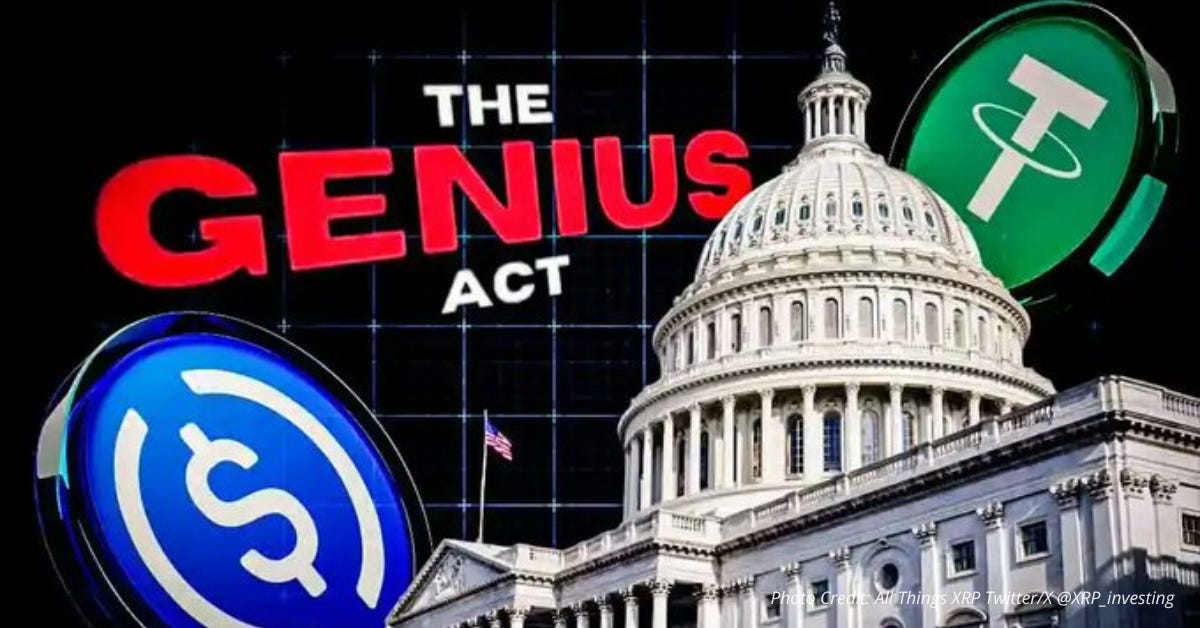The GENIUS Act: A Trojan Horse for Financial Consolidation?
The Hits Just Keep On Coming... Get The Details Inside - Read, Share, & Get A Paid Subscription To Ripped From The Headlines at SherlocExposes.com
The Skinny
Today, President Donald Trump signed the GENIUS Act (Guiding and Establishing National Innovation for U.S. Stablecoins) into law. On paper, the legislation is meant to bring clarity and consumer protection to the $250+ billion stablecoin market.
But a deeper look reveals an all-too-familiar reality: a carefully engineered framework written by, and for, major financial and tech interests.
As the law opens the door to “mainstream” adoption, it also quietly locks out small innovators, decentralization advocates, and everyday Americans from shaping the future of digital money.
What’s A Stable Coin?
Stablecoins are a type of digital money that are designed to always be worth the same as regular money, like a U.S. dollar. So if you have one stablecoin, it's supposed to be worth one dollar… kind of like a digital version of a dollar bill you can use on the internet.
What The Bill Does… And Doesn’t Do
At a glance, the GENIUS Act provides the first comprehensive U.S. legal framework for Stablecoins - digital tokens pegged to the U.S. dollar. Here are the main features:
Issuers must hold 1:1 reserves in dollars, Treasuries, or similar low-risk assets.
Only banks, credit unions, and fintechs under $10 billion (with state or federal approval) can issue stablecoins.
Monthly disclosures and annual audits are required.
Stablecoin issuers cannot offer yield directly… but third parties may still structure “reward” systems.
A federal/state oversight structure involving the Fed, Treasury, OCC, and state regulators.
Hot Take: Supporters say the act protects users and prevents a digital “run on the bank.”
But critics, including analysts, some lawmakers, and elements of the parallel economy - warn that it may create the illusion of decentralization while cementing centralized control.
So… Who Wrote This Thing?
That’s the right question.
While the bill was passed by Congress and signed by the President, the blueprints came straight from the tech-finance complex.
According to Reuters, major input came from executives at Coinbase, Circle, Gemini, PayPal, Robinhood, and Fidelity Digital Assets. Insiders from JPMorgan, Visa, and Amazon Web Services also helped shape the compliance standards and interoperability clauses buried in the bill’s technical annex.
Let’s call it what it is: a law co-authored by the very institutions it purports to regulate.
THIS IS EXACTLY HOW YOU GOT OBAMACARE.
This isn’t conspiracy, though you may feel the need to reach for your tinfoil hat.
It’s confirmation of what we’ve flagged repeatedly in Ripped From The Headlines: public-facing regulation often masks private-sector engineering.
RED FLAG ALERTS!
Let’s set the political personalities aside and assess the structure:
1. Consolidation over Innovation
The Genius bill narrows who can legally issue stablecoins. If you’re a community credit union, startup, or nonbank DeFi innovator, you’re out… unless you spend millions navigating a patchwork of federal and state approvals.
This ensures stablecoin issuance is confined to those with lawyers, lobbyists, and long-standing ties to Washington.
2. No CBDC Ban in the Final Law
While the House passed a separate bill to ban a U.S. Central Bank Digital Currency (CBDC), it was not included in the GENIUS Act and faces uncertain prospects in the Senate. Rep. Marjorie Taylor Greene has already raised the alarm that the CBDC ban is at risk of being stripped out entirely — leaving the surveillance architecture intact.
“They passed a stablecoin bill, and the CBDC ban is still in limbo,” she warned on social media. “That should tell you everything.” - Rep. Marjorie Taylor Greene
The GENIUS Act could be used by a future administration as a regulatory skeleton for an eventual CBDC rollout.
3. No FDIC Protections, No Consumer Guarantees
Despite reserve requirements, users are still exposed. These tokens are not FDIC insured, and if the issuing entity fails, redemption could be frozen or delayed. The safeguards are advisory, not absolute.
And, if you remember anything about the FDIC, when you hear their name, it usually isn’t good.
Sherloc Connects The Dots… Again
At Ripped From The Headlines, we’ve been tracking the evolving convergence of digital finance, politics, and public policy for the past three years. This bill fits into a pattern:
In March, we reported on early campaign-related meme coins, including $TRUMP, and their use as fundraising tools with little oversight.
In June, we explored how decentralized finance is being reshaped by central authorities, particularly through regulatory proposals that favor legacy institutions.
Our original piece on Randall Crater & My Big Coin in 2022 clearly showed you how they plan to pick winners and losers in crypto.
The GENIUS Act reflects a continuation of these trends: a push to domesticate and centralize innovation in digital assets, rather than let it flourish decentralized.
What Does This Mean For You?
Despite headlines that celebrate innovation and consumer safety, the GENIUS Act does not empower the average American.
It narrows the funnel of participation, grants disproportionate advantage to firms who helped draft it, and offers minimal direct benefit to small-dollar users.
Those advocating for localism, parallel economies, privacy, or decentralized financial tools should take note: this is a federal greenlight for digital money, but under tight elite management.
In Short: Your technocracy is coming in a red dress instead of a blue dress.
SHERLOC RESEARCH: KNOW WHAT’S COMING… BEFORE IT ARRIVES
At Sherloc Market Research, we don’t just track trends - we trace the strategy behind the headlines. We’ve been ahead of the curve on central bank digital currencies, ESG financial coercion, and now, the AI centralization wave.
If you want to understand not just what is happening, but why, and how it fits into the bigger picture of state sovereignty, global consolidation, and the coming economic realignment… Ask Sherloc.
James Wesley, Rawles, publisher of SurvivalBlog.com has put together a “bookshelf” list of key things you should have. CLICK HERE to access the list.
Plus a recap of the 50 things you should have handy to barter.
Share this email with everyone you know. Sign up for a free or paid subscription. Paid members will receive our in-depth solutions.
Ripped From The Headlines is your daily digest of what’s happening in the world. We help you to understand what it means, why you should care, and what you should do.









